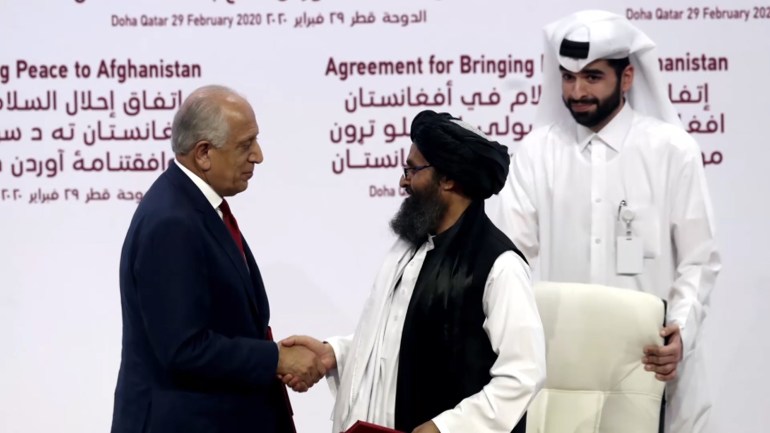Zalmay Khalilzad became the face of one of the greatest American diplomatic failures in modern history.
Two months after the fall of all of Afghanistan to the Taliban and the collapse of the US-backed Afghan government, the diplomat Tom West will succeed his former president, Zalmay Khalilzad, as the US envoy to Afghanistan.
"With Special Representative for Afghan Reconciliation Zalmay Khalilzad stepping down, I am grateful for his decades of service to the American people," Secretary of State Tony Blinken said in a statement.
For his part, Khalilzad said he decided the time was right to step down "at a time when we are entering a new phase in our policy toward Afghanistan."
Khalilzad added, "The arrangement of the political situation between the Afghan government and the Taliban movement did not proceed as expected, and the reasons for that are very complex. I will share my thoughts in the coming days and weeks after I left my government job."
Khalilzad, who is of Afghan origin, served as the Special Representative for Reconciliation in Afghanistan under Presidents Donald Trump and Joe Biden.
Khalilzad is a well-known veteran diplomat in Washington's foreign policy circles, and has served as the US ambassador to Iraq and the United Nations.
For its part, the Taliban government announced on Tuesday that it hopes to build on the "good progress" made in talks with former US envoy to Afghanistan Zalmay Khalilzad, and expressed optimism about moving forward with his successor, Tom West.
Khalilzad led the American side in the negotiations with the Taliban that resulted in the Doha Agreement after a 20-year war (Al-Jazeera)
Khalilzad does not fit the Biden administration
Khalilzad led the American side in negotiations with the Taliban, hosted by Qatar that resulted in the Doha agreement in February 2020 requiring the complete withdrawal of US forces by May 2021.
In 2019, then-Afghan National Security Adviser Hamdullah Mohib accused Khalilzad of being driven by personal political gain rather than peace.
In an interview with Al-Jazeera Net, the former Assistant Secretary of State, Ambassador David Mack, said that "Khalilzad's vision for the future of Afghan-American relations is in sharp contrast with the foreign policy of the Biden administration; the Taliban and the Biden administration, at a time when Biden was determined to limit relations with the Taliban."
Ambassador Mac noted that the Biden administration "has been in dire need of a back channel to communicate with the Taliban in recent months, and Khalilzad may have played a role in that. Today, Secretary of State Tony Blinken and CIA Director Bill Burns may have made new arrangements for contacts with the Taliban." This did not include any role for Zalmay Khalilzad."
Ambassador Mac indicated that Tom West's mission - Khalilzad's successor - "is related to specific cooperation with the Taliban in a limited number of issues, including confronting (ISIS in Khorasan), providing humanitarian aid, calling on the Taliban to respect human rights and women, and facilitating the exit of those who wish to leave. Afghanistan".
Dreams of the Nobel Peace Prize evaporate
One of Ambassador Khalilzad's former colleagues - whom government work has brought with him over the years - spoke of Khalilzad's ambitions and personality that contributed to some aspects of the biggest US diplomatic failure in recent years, the chaos of the withdrawal from Kabul and the fall of Afghanistan to the Taliban.
The former official, who declined to be named, said Khalilzad "had very good political and diplomatic skills, was respected by many, and his personal connection to Afghanistan helped him to have a sincere desire to end the fighting and bring peace to it."
However, the former official added, "History will not mention Khalilzad until the last scene of his long journey to bring peace to Afghanistan. The man aspired, planned and dreamed of receiving the Nobel Peace Prize for his role in restoring peace to a country torn by civil wars and foreign invasions over many decades, and instead of That ended up with him as an official and participant who failed to secure a peace agreement between the Afghan parties, and left Afghanistan up for grabs to be controlled by the Taliban.”
The former official considered that "Khalilzad defended his positions that President Trump was the one who commissioned him and pressured him to reach an agreement in any unconvincing way. Trump retracted from agreeing to a bad agreement in September 2019, but Khalilzad restored the agreement and it was approved in February 2020 Despite the exclusion of the legitimate government in Kabul, and the absence of any guarantees or commitments from the Taliban movement.
The February 2020 agreement was the beginning of the end, as Khalilzad envisioned that developing strong personal relations with Taliban leaders would deter them from advancing and controlling all of the country without negotiating with the rest of the Afghan forces, according to the former official.
The former official was surprised by "Khalilzad's personalization of the negotiations, and considering that there is a big role for his personal relations with the Taliban, which the Taliban did not recognize and did not include in its calculations on the ground."
The former official concluded his conversation with Al Jazeera Net by saying, "When facing any problem or crisis during the long negotiation process, the Taliban did not retreat, and Khalilzad did not want the negotiations to fail, from here he was the retreating party all the time, and this is what brought us to the scenes of mid-August / Last August, when the Taliban took control of the capital, Kabul.

